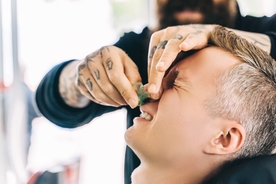The Centers for Disease Control has warned that men sporting mustaches, beards, or any other facial hair risk their facemasks/respirators not functioning correctly, the New York Post has reported.
An infographic created by the CDC (initially released during the 2017 No-Shave November campaign), has recently resurfaced, showing which facial hairstyles are incompatible with the facemasks/respirators that are commonly being worn as a prevention method during the global coronavirus (COVID-19) outbreak.
Apparently, being clean-shaven or having a soul patch, side-whiskers, pencil, toothbrush mustache, walrus mustache, or handlebar mustache, is fine, but styles such as stubble, a thick beard, or mutton chops are likely to interfere with respirators, by limiting the effectiveness of the respirator's exhalation valve if they come into contact.
Recently a Chinese doctor was filmed crying over the number of Coronavirus cases she had to deal with:Facial hair doesn't act as an adequate filter, due to its lack of density, and can actually trap germs and harmful bacteria.

The CDC's official blog notes: "Gases, vapors, and particles in the air will take the path of least resistance and bypass the part of the respirator that captures or filters hazards out. So then, why can’t facial hair act as a crude filter to capture particles that pass between the respirator sealing area and the skin?"

It continues: "While human hair appears to be very thin to the naked eye, hair is much larger in size than the particles inhaled. Facial hair is just not dense enough and the individual hairs are too large to capture particles like an air filter does; nor will a beard trap gases and vapors like the carbon bed in a respirator cartridge. "
It adds: "The vast majority of particles, gases, and vapors follow the air stream right through the facial hair and into the respiratory tract of the wearer. In fact, some studies have shown that even a day or two of stubble can begin to reduce protection. Research tells us that the presence of facial hair under the sealing surface causes 20 to 1000 times more leakage compared to clean-shaven individuals."
However, the CDC has also stated that people who are showing symptoms of the coronavirus or are caring for somebody in close settings are the only people who should be wearing facemasks - adding that people who are perfectly healthy need not wear a mask.
Per CBS, the Centers for Disease Control and Prevention says it "does not recommend that people who are well wear a facemask to protect themselves from respiratory diseases, including COVID-19."
"Facemasks should be used by people who show symptoms of COVID-19 to help prevent the spread of the disease to others," the CDC's website says. "The use of facemasks is also crucial for health workers and people who are taking care of someone in close settings (at home or in a health care facility)."


